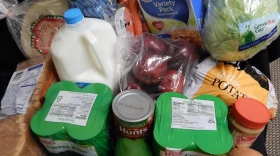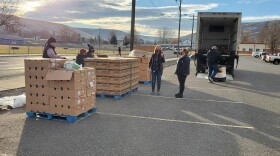-
A federal judge temporarily blocked an order from the Trump administration.
-
About 600,000 Coloradans receive Supplemental Nutrition Assistance Program benefits.
-
The Denver Public Schools Foundation is using a fund to buy grocery gift cards for families affected by the delays in Supplemental Nutrition Assistance Program, or SNAP, payments and to help stock school food pantries, which have reportedly seen an uptick in visitors.
-
That will come as welcome news to the 600,000 Coloradans, half of whom are children, who rely on SNAP funding to help buy groceries each month.
-
Local governments across Colorado face budget deficits in 2026. Some are tapping their reserves to keep people fed as SNAP benefits lapse.
-
Colorado’s Joint Budget Committee has approved spending $10 million from the state’s reserves to shore up food banks and food assistance programs.
-
Colorado communities are preparing for an unprecedented end to federal food assistance with the government shutdown grinding on. Supplemental Nutrition Assistance Program or SNAP benefits will run out on November 1st.
-
The ongoing federal government shutdown is putting crucial food programs – and families that rely on them – at risk.
-
The lawsuit filed by about two dozen states would force the USDA to tap a contingency fund for SNAP benefits.
-
Polis is also asking the legislature for $10 million as 600,000 Coloradans are about to lose food stamps in “crisis within a crisis." Listen to "Morning Edition" host Michael Lyle, Jr. discuss this story with Colorado Sun reporter Michael Booth and the read the entire article at the link below.

Play Live Radio
Next Up:
0:00
0:00
Available On Air Stations







